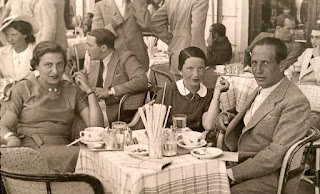Visitation Ladies
When I first
came to Chicago in the early 80s I volunteered at a city mission. It was fairly
disorganized and chaotic. I never knew from one day to the next what my
assignment would be. Often the mission got requests from the elderly for help
with household chores. Some of this was ridiculous—they didn’t need help, they
needed a bulldozer. I got used to heading out with an address in my pocket
expecting anything. I remember wading through an apartment filled thigh-high
with trash. Mixed in were bags of money, just randomly tossed about. I wrote
about visiting Ida and her vermin-filled apartment. Later she was found dead
beneath a blanket of newspapers. (see "That Which I Should Have Done I Did Not Do", Spring 2012, Adroit Journal)
The point is
you didn’t know what you’d get.
In these
current unsettling times I’ve been having déjà vu. My mind keeps flashing back
to past visitation ladies.
Back then
Ronald Reagan had been elected on a wave of populism. Supposedly a happier day
was on the horizon— after deregulation, after the recession, after the
factories closed. There was an explosion of homelessness. AIDS was largely
ignored, a plague visited upon gays. The only thing that made facing each day
easier was that there was no Internet or constant news cycle. Now I wake up and
am instantly bombarded: attacks on Jewish community centers, Jewish daycares,
Jewish cemeteries. White supremists marching in the streets, waving their flags.
Hundreds, thousands of people being rounded up and deported. Citizens afraid to
leave their home. Journalists derided as the “enemy.” Rumors of a Muslim registry.
Travel bans.
Several visitation
ladies had lived through the worst of times. Niki, Nevena Stojcic, was 18 years
old when she was kidnapped off the streets of her town in Serbia by German
soldiers and forced to work in a submarine factory. She had been born with a
dislocated hip. Back then something as simple to correct was left, so she was hobbled.
Consequently her back became twisted with scoliosis. Permanently small, she was
perfect to get in to tiny, tight spaces to rivet. She lived through air raids
and bombings of the factory, daily she was threatened with sexual assault,
always she was in physical pain. At the end of the war, unwilling to return to
communist Yugoslavia, she went first to France and after five years as a
displaced person, she was able to immigrate to the United States. By this time,
1950, she was 24.
Hilde “visited”
Niki until her death in 1999. Towards the end of her life, after several
surgeries and a hip replacement, her body began to give out. Infections caused
her body to become septic and she had to have a leg amputated. She became
wheelchair bound. According to Hilde: “One amazing thing about Niki was that in
the midst of all her hardships she knew that God loved her and would listen to
her. She loved the psalms in which David would pour out his complaints to God. ‘If he could do
it, I can do it,’ ” she would say. Hilde once told me that if she had another
daughter she would have named her Nevena.
Hilde
memorialized Niki in a
song that she wrote and performed with her band The Crossing.
Eva was a Jew
who escaped from Nazi Germany in 1939. As she matured into a teenager she saw
the writing as it were on the wall. She complained to her father about perceived
injustices. Her father, a doctor, basically told her to chill. It’s not going
to happen; it’s not going to get that bad. Our neighbors will never turn on us.
Nevertheless,
Eva and her boyfriend and two other friends just 19 years old make plans. She
bribes an official to get papers for the four of them. They have to figure out
(pre-Internet!) how to safely cross borders. And, they cannot take anything
with them. Luggage would be a dead give-away. So the day arrives and Eva and
her boyfriend set out. Her mother comes with her as far as she can, as she has
no papers, and at a certain stop they say good bye.
She never saw
her mother, father, and sister again. She never knew what happened, their
letters suddenly stopped.
After a series
of connections Eva and her boyfriend arrived in New York City. He proposed to
her in a comic fashion. He went to get a driver’s license and came back with a
marriage license instead! Afterwards they settled in Chicago to wait out the
war.
Meanwhile her
brother made it as far as Canada where because he was a German citizen he was
interred in a camp. It was only later Eva learned the truth about the rest of
her family. Her father died of an illness, but her mother and sister were
rounded up and transported to Auschwitz. Eva and her husband visited the Holocaust
Museum in DC soon after it opened. A staff person took her aside—would you like
to go to the Archive Room. There, was the records the Germans had kept of all the
deportees. Eva’s mother and sister were killed immediately after arriving at
the camp.
Eva and her
husband never had children and he passed away before her. She was sick and
lonely when Sarah Sullivan, my friend, met her. Little by little age
incapacitated her and she’d complain. Sarah told me she’d have to say to Eva:
Listen you escaped from the Nazis, you can do this! Until the end she attended
the opera. She lived until age 94.
 |
| Eva and husband at outdoor Berlin cafe, right before leaving, Eva in the middle |
 |
| Eva with friend who was killed during war as a spy/saboteur |
 |
| Eva when Sarah met her |
Comments